EUR/CHF- Might find a way to touch 61.8 fib of the previous up swing. 1.6422 to 1.6400 before a possible nice rebound.
Resistances
1,6505 - 1,6560
Supports
1,6470 - 1,6450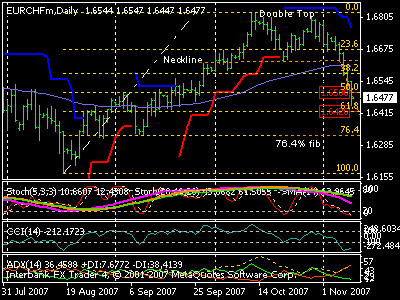
EUR/USD- Just bounce off a major trendline. an uptrend supported by 1hr Stoch and CCI. The volatility is high. A parallel channel can be drawn to form a trend. My trend indicator 4hr and daily is in a bullish configuration. The price should continue to consolidate with bias to the upside. The price might continue to move in 1,4660 - 1,4730 range. I won't take a position. The risk/reward ratio is too high to take a position.
Resistances
1,4730 - 1,4750
Supports
1,4670 - 1,4615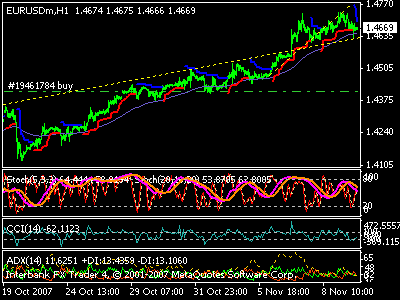
GBP/USD- Just fomed a pin bar 3hrs before the market close of last week. Trend bias is bull on higher TimeFrames. 1hr Stoch and CCI crossed significant levels up.
Trade suggestion: Open a long position as soon as the market open, set TP at 38.2 fib and 2nd TP at 50 fib of the last swing down. That's 2.0977 and 2.1009. SL at 2.0800. Adjust SL to breakeven if price passed 2.0940. Trail stop the 2nd position if you want. Trade at your own risk.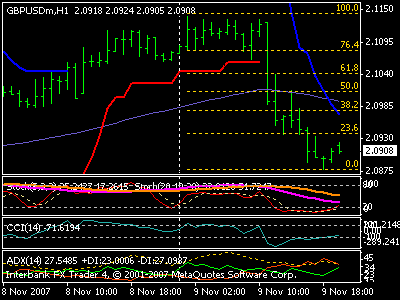
Best time to use the True North Hedge. Learn it HERE!
EUR/CHF, EUR/USD & GBP/USD Analysis for Monday
Fed Comments Pushes The Dollar Down
A recent speech by Ben Bernanke, chairman of the US Federal Reserve Bank, sent the Dollar spiraling downward to fresh lows against all of the world's major currencies. This is perhaps surprising, given that Bernanke used the speech to warn that higher-than-expected inflation may drive the Fed to hike rates, which is exactly what Dollar bulls wanted to hear. The downside of the speech, reflected in the markets' reaction, was that the primary cause of the inflation is rising oil prices, would could plunge the US economy into stagflation: slow growth and high inflation, an unenviable position if there ever was one.
Posted by
HARWIN
at
2:21 AM
0
comments
![]()
Labels: fed, forex news
Yen Surges On Risk Aversion
Last week, The yen rose sharply across the board on rising concerns over the credit market. The currency hit a 1 ½ year high at 110.52 versus the dollar. The euro dropped from 166 to just above 162 against the yen, and the sterling slumped 7 big figures to as low as 231.20 versus the yen.
Fed Chairman Bernanke said yesterday in Congressional Testimony that the contraction in housing market may continue to drag the economy and the nation's economic growth is likely to slow down noticeably. His comments raised worries over the housing and credit market, increasing the case for another quarter-percentage point rate cut in December. For fear of further losses in banks from subprime related investments, investors cut back risk appetite and therefore wound the carry trades.
How to take advantage after the carrys unwind? Learn it more HERE!
Posted by
HARWIN
at
6:37 AM
0
comments
![]()
Labels: carry trades, subprime, yen
Supermodel Bundchen Joins Hedge Funds Dumping Dollars
Nov. 5 (Bloomberg) -- Gisele Bundchen wants to remain the world's richest model and is insisting that she be paid in almost any currency but the U.S. dollar.
Like billionaire investors Warren Buffett and Bill Gross, the Brazilian supermodel, who Forbes magazine says earns more than anyone in her industry, is at the top of a growing list of rich people who have concluded that the currency can only depreciate because Americans led by President George W. Bush are living beyond their means.
Even after the dollar lost 34 percent since 2001, the biggest investors and most accurate forecasters say it will weaken further as home sales fall and the Federal Reserve cuts interest rates. The dollar plummeted to its lowest ever last week against the euro, Canadian dollar, Chinese yuan and the cheapest in 26 years against the British pound.
Posted by
HARWIN
at
12:23 AM
0
comments
![]()
Self-Control: Expanding Your Limits
by Mark Turcotte
Winning traders are "disciplined." They don't allow their emotions or impulses to get the better of them. They approach the markets in a way that allows them to trade skillfully. As one professional hedge fund manager put it,"[Trading is] just like sports. The difference between the physical abilities of the top pros is virtually nothing. But the mental difference is huge. The guys at the top...are mentally
consistent...It's the same thing in trading. The psychology of professional traders allows them to stick to their strategies. They don't stress out as much as the rookie traders. I still make mistakes once in a while, but not as much as I did... It's impossible to eliminate all of it. I still fall victim to doubt and other
psychological pitfalls. I still have major doubts and stress starting to come in...As far as dealing with the ups and the downs, this requires a combination of research and experience. After a while, making or losing a lot...becomes second nature...there's a sense of normalizing the ups and downs...you don't get as excited over them. It's just an event...After a while, it's just a cycle." Maintaining
discipline and control doesn't mean that winning traders don't have a passion for trading. Of course they do, but at the same time, they don't allow their emotions or impulses to overwhelm them. Over time, and with a vast amount of experience, trading becomes commonplace and one naturally approaches trading with the proper mental edge.
Trading requires discipline. A trading plan is of little value if you abandon it prematurely. The disciplined trader executes a plan and controls his or her emotions until the plan comes to fruition. Although most traders intellectually understand the importance of discipline, many would-be traders have trouble staying controlled at critical moments of investing.
Drs. Baumeister, Muraven, and Tice (2000) argue that self-control is a limited resource. When we show self-control in one area, such as trying to control our diet, we don't have energy left to show self-control in other areas, such as concentrating on following our trading plan. Now, that's not to say that one should abandon dieting in order to be a disciplined trader, but it's useful to consider that humans have limits regarding their ability to show self-control. Self-control is like a
muscle. If you try to lift too much, you'll wear yourself out and you'll need to get some rest before you can try lifting a heavy object again. The same can be said of self-control. In a recent review of the scientific literature, Gailliot and Baumeister (2007) document a vast array of evidence that shows that after participants complete one laboratory task on self control, they have difficulty performing a second task. For example, if you try to avoid eating your favorite snack, studies have shown that you are likely to give up when trying to complete a frustrating task. Self-control is a limited resource. Just like when you work out. If you work out too long, you need to rest a little while before doing physical exercise.
Stress can reduce your ability to maintain self-control while trading. Coping with stress saps up the limited psychological resources you have to devote to self-control. A study by Oaten and Cheng (2005) illustrates how stress limits self-control. They randomly assigned participants to complete a task either under stress or under no stress.
When participants were stressed out, they had difficulty completing the laboratory task. They also reported having difficulty keeping up with demands in their everyday lives, such as controlling their diet or keeping their house clean.
These findings suggest that self-control is like a muscle that can become worn out. If you try to trade while overly stressed out in your personal life, you'll have trouble sticking with your trading plan, especially if you are a novice trader who has relatively little experience maintaining discipline when your money is on the line. It's important to be aware of your ability to maintain discipline. Just like
a muscle,if try to do too much, your self-control "muscle" will fail. Rather than over-taxing your limited self-control resource, it's vital that you start out slow and work up to gaining more self-control.
How do you build up self-control "muscles"? First, minimize daily stressors, or if you have a lot of stress, cut back on your trading until you can alleviate stress and free up psychological energy in your personal life. Second, do self-control workouts. The more practice you have at self-control, the more likely you'll be able to stay disciplined while executing a trade. You might try a visualization exercise in which you imagine yourself executing a trading plan and maintaining self-control under a variety of scenarios.
The winning trader is the disciplined trader. But discipline isn't easy to come by. It's vital that you acknowledge your limitations. Don't set yourself up for failure by thinking you can be disciplined all the time. Like everything else, discipline takes practice. The more you can build up your self-control "muscles," the more easily you can execute your trading plans with grace and decisiveness.
Posted by
HARWIN
at
12:02 AM
0
comments
![]()
Labels: discipline, emotional tools
EUR/CHF Outcome
A few days back, I said it here that eur/chf has a greater chance to drop to the 50% or 68.1% fib of its last major swing up.
Here's the same chart I posted last Nov. 6: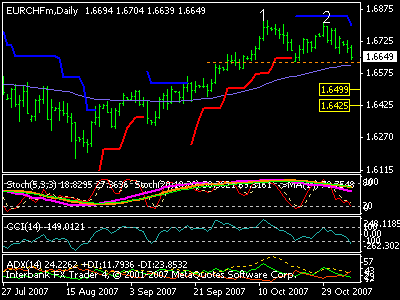
And here is the outcome of that analysis. A perfect double top formation.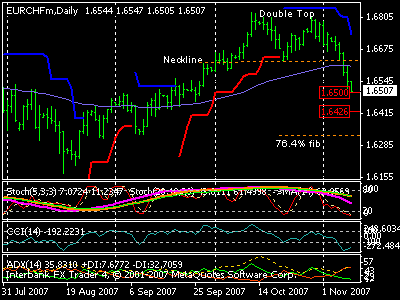
The graph shows big players are cutting their risk appetite to high yielders. A steep decline with great momentum can pull the price down to 68.1%. Break of 76.4% fib will curtail the bull.
Price is now at the 50% fib, might bounce off from here for awhile before continues its bearish trend. ..... I hope not.
So, traders who are using (long) inverse hedge strategy. If you are trading more than 20% risk, cut your losses by 50% and hold the rest. If it is less than 10% risk you're trading, Take a vacation! Come back in a week.
These are normal. It is the much needed correction after a long way up.
To know more about the inverse hedge, Click here.
Posted by
HARWIN
at
2:51 PM
0
comments
![]()
Labels: EUR/CHF
Dollar Fell on Bernanke Testimony
The dollar slid further across the board after the Fed Chairman Bernanke testified in front of the Congress. The euro hovers just below the 1.47 level against the dollar, while the sterling climbed to as high as 2.1116 versus the dollar. The yen also gained against the dollar from above 113 to a session low at 112.07.
Bernanke today warned that the housing sector conditions may become more severe, increasing worries over the housing and credit issue. He also said the nation¡¯s economic growth may slow noticeably, raising expectations for further rate cut. Interest rate futures showed traders are pricing in an 82 percent chance that the Fed will cut interest rates by a quarter-percentage point in December.
The Euro and sterling remains robust against the dollar after the European Central Bank and the Bank of England left their interest rates unchanged at 4.0% and 5.75% respectively as expected today.
The ECB and BOE postponed rate hikes they planned earlier because of this summer¡¯s global financial market turmoil triggered by US credit crunch. Before the extent of damage from subprime loans related investments are clear, the banks need to keep cautious and do not rush raising rates though the inflation seems to be elevated. In the short term, these two central banks are more likely to keep their benchmark rates unchanged.
While global equity market fell today, investors cut their risk appetite. The yen, as a low yielding currency, benefited from the decline in carry trades.
Posted by
HARWIN
at
2:34 PM
0
comments
![]()
Labels: carry trades, economic news










